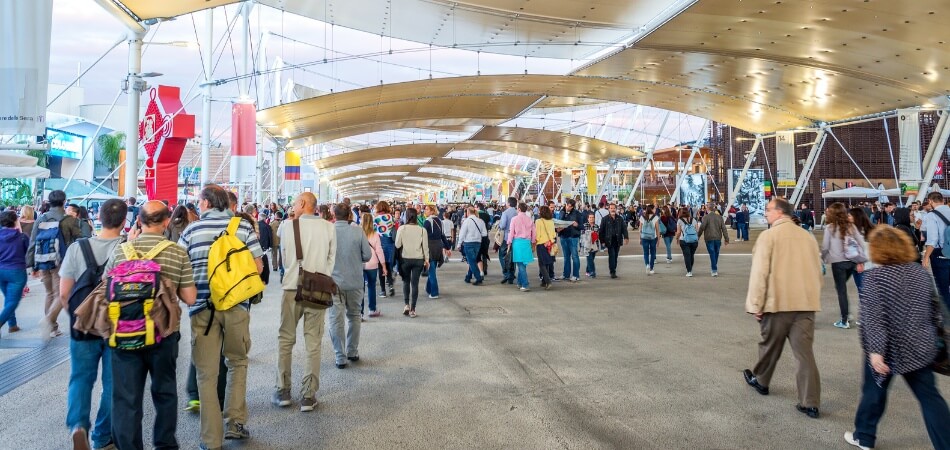Expos and fairs are two terms that often come to mind when discussing large-scale events. These events, while seemingly similar, cater to distinct audiences and serve different purposes. So, what’s the difference between an expo and a fair?
An expo is primarily a trade-focused gathering where businesses and professionals converge to exhibit and explore new products and services. It’s a hub for industry insights and networking.
On the flip side, a fair is a more consumer-oriented spectacle, brimming with entertainment, games, and an array of vendors. It’s designed to charm a wide public audience with its diverse attractions.
Are you curious about what we have to say? Let’s take a closer look at what makes expos and fairs so unique in the rest of this article as we explore some of their unique characteristics.
A Brief Overview of Expos and Fairs
Expos and fairs offer distinct experiences, each tailored to different audiences. Expos focus on trade and industry, showcasing innovations and fostering professional connections. Fairs, meanwhile, promise entertainment and a community atmosphere, appealing to families and individuals seeking fun.

In the world of expos, businesses and professionals gather to exhibit cutting-edge products and services, engaging in valuable networking and learning. These events are vital for industry growth and collaboration. Fairs, on the other hand, are festive and diverse, featuring games, food, and various vendors, creating a vibrant and enjoyable environment for the general public.
Types of Expos You Can Attend
Expos, vibrant hubs of innovation and networking, come in various types, each catering to specific industries and interests. These gatherings are crucial for sharing knowledge, showcasing new products, and fostering professional relationships. Here are the different types of expos, understanding them will help in selecting the right one to attend:

- Trade Expos: Focused on B2B interactions, trade expos are ideal for industry professionals seeking partnerships and clients. Exhibitors display their latest products, while attendees engage in networking and learning sessions. These expos are pivotal for staying abreast of industry trends and advancements.
- Consumer Expos: Tailored for the general public, consumer expos offer a glimpse into new products and services. Here, businesses interact directly with consumers, gaining valuable feedback and increasing brand awareness. These events are perfect for product launches and customer engagement.
- Technology Expos: Showcasing the latest in tech advancements, these expos are a haven for tech enthusiasts and professionals. They feature cutting-edge innovations, seminars on emerging tech trends, and opportunities for collaboration in the tech industry.
- Cultural Expos: Celebrating diverse cultures and arts, cultural expos are vibrant events that highlight traditional and contemporary art forms. They are platforms for cultural exchange, artistic expression, and understanding global diversity.
In conclusion, expos provide unique opportunities for learning, networking, and discovery, regardless of your industry or interest. Whether you’re a professional, consumer, tech enthusiast, or cultural aficionado, there’s an expo out there that will enrich your experience and knowledge.
Types of Fairs You Can Attend
Fairs come in a kaleidoscope of themes and purposes, each offering a unique experience. From agricultural showcases to cultural celebrations, these events cater to a wide range of interests. Exploring the various types of fairs can lead to unexpected discoveries and enjoyable experiences.

- Agricultural Fairs: These fairs celebrate farming and rural life, often featuring livestock competitions, farming equipment displays, and educational exhibits. They’re a nexus for farmers to share knowledge and for visitors to learn about agriculture. Local produce and handicrafts are also prominent, showcasing the best of rural craftsmanship and cuisine.
- Cultural Fairs: Embracing the richness of diverse cultures, these fairs offer a window into the traditions, arts, and foods of different communities. They’re vibrant gatherings that promote cultural understanding and exchange, featuring traditional music, dance, and crafts. Such events strengthen community bonds and enhance cultural appreciation.
- Art Fairs: Art enthusiasts flock to these events, where artists and galleries display contemporary artworks. They’re ideal for discovering emerging talents and appreciating established artists, providing a platform for creative expression and discussion. Art fairs often include workshops and talks, enriching the artistic experience for attendees.
- Science Fairs: Focused on innovation and education, science fairs showcase experiments, inventions, and research projects. They’re platforms for budding scientists to present their work, encouraging curiosity and learning in STEM fields. Interactive exhibits and expert talks make these fairs both informative and engaging.
In conclusion, the world of fairs is as diverse as it is dynamic, offering something for everyone. Whether you’re a farmer, artist, cultural enthusiast, or science aficionado, there’s a fair out there that will spark your interest and provide an enriching experience. Keep exploring and you’re sure to find a fair that resonates with your passions and curiosity.
What’s the Difference Between an Expo and a Fair?
Navigating the vibrant landscape of large-scale events often leads to a common question: What’s the difference between an expo and a fair? While both are popular event formats, they cater to distinct purposes and audiences. Understanding these differences is key to appreciating the unique experiences each offers. Here are the Major differences between the two:

Purpose and Audience
Expos are primarily trade-oriented events designed for professionals and businesses. They focus on industry advancements, networking, and showcasing new products or services. Attendees are typically industry experts, entrepreneurs, and business representatives seeking to expand their knowledge and contacts.
In contrast, fairs are public events aimed at entertainment and community engagement. They attract families, locals, and tourists seeking leisure and fun. Fairs offer a diverse range of activities from rides and games to food stalls, appealing to a broader audience.
Content and Activities
Expos are characterized by their professional seminars, product demonstrations, and B2B meetings. They’re platforms for innovation, learning, and commercial transactions. The atmosphere is geared towards professional development and industry trends.
Fairs, however, are known for their festive atmosphere. They feature carnival rides, live performances, and artisanal markets. These events celebrate local culture, crafts, and community spirit, providing a relaxed and enjoyable experience for all ages.
While expos and fairs may appear similar at first glance, they serve distinctly different purposes and cater to unique audiences. Expos are professional, industry-focused events, while fairs are community-centric, offering entertainment and cultural experiences. Recognizing these differences enhances our understanding and enjoyment of these diverse event formats.
Pros and Cons of Attending an Expo
Expos are dynamic platforms that offer a wealth of opportunities and experiences, especially for professionals and businesses. They serve as hubs for industry insights, networking, and innovation. However, like any event, expos come with their own set of advantages and challenges.
Pros
- Networking opportunities with industry professionals and potential clients.
- Exposure to the latest industry trends and innovations.
- Opportunities for learning through seminars and workshops.
- Potential to form new business partnerships and collaborations.
- A platform to showcase products or services to a targeted audience.
- Gathering competitive intelligence and market insights.
- Chance to enhance brand visibility and recognition.
Cons
- Can be costly in terms of registration fees, travel, and accommodations.
- Time-consuming, requiring significant preparation and attendance time.
- Overwhelming size and scope may lead to missed opportunities.
- Potential for information overload due to the vast number of exhibits and sessions.
- Limited personal interaction in large-scale expos.
In summary, attending an expo can be a highly rewarding experience, offering numerous benefits for professional growth and business development. However, it’s important to weigh these advantages against the potential drawbacks such as cost and time commitment. Careful planning and a clear objective can help maximize the benefits of attending an expo.
Pros and Cons of Attending a Fair
Fairs, with their vibrant atmosphere and diverse offerings, are popular attractions for many. They provide a unique blend of entertainment, culture, and community engagement. However, like any event, attending a fair has its advantages and drawbacks.
Pros
- Fairs offer a variety of entertainment options, from thrilling rides to live performances.
- They are great opportunities for family bonding and creating lasting memories.
- Local crafts and food stalls provide a taste of regional culture and cuisine.
- Fairs often feature educational exhibits, promoting learning in a fun environment.
- They support local economies by boosting small businesses and artisans.
- Fairs are excellent for socializing and meeting new people in a relaxed setting.
- The festive atmosphere at fairs can be a great mood booster.
Cons
- Crowds and long lines at popular attractions can be overwhelming.
- The cost of rides, games, and food can add up quickly.
- Outdoor fairs are subject to weather conditions, which can impact the experience.
- Parking can be challenging and often requires walking long distances.
- Noise levels at fairs can be high, which might not be comfortable for everyone.
While fairs provide a wealth of entertainment and cultural experiences, they also come with certain challenges. Weighing these pros and cons can help you decide whether attending a fair is the right choice for your next outing. Whether for fun, learning, or cultural exploration, fairs offer something unique for everyone.
Final Considerations
We have identified the unique characteristics and purposes that distinguish an expo from a fair based on our exploration of “What’s the difference between an expo and a fair?” Expos, with its focus on trade and industry, offers professionals a platform for networking, learning, and showcasing innovations.
On the other hand, fairs provide a festive, public-oriented experience, rich in entertainment, culture, and community bonding. The decision to attend depends on one’s personal or professional objectives.
Understanding these differences is crucial for anyone looking to maximize their experience, whether it’s for business growth at an expo or family enjoyment at a fair. Each event offers its own set of benefits and challenges, and choosing wisely can lead to valuable and enjoyable experiences tailored to individual needs and interests.


